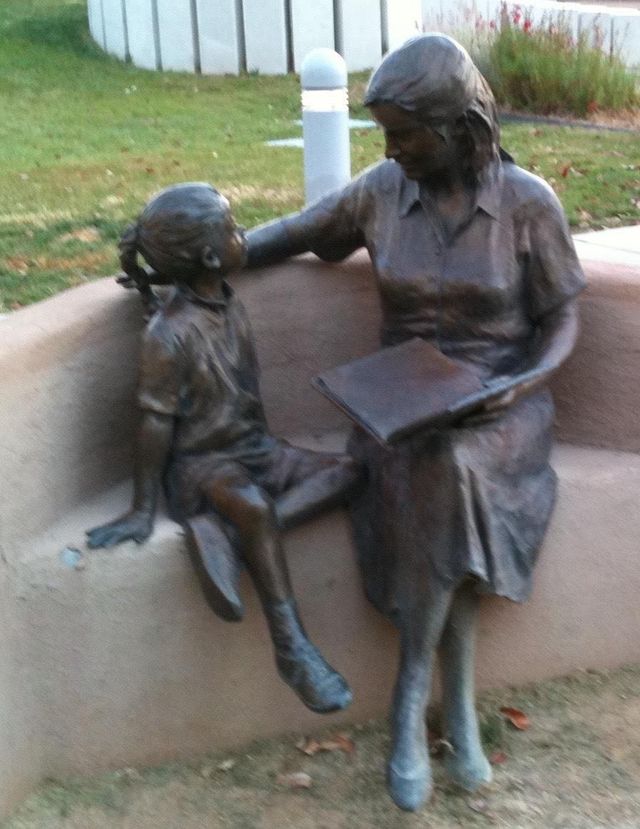CALLING INTO QUESTION
By Brad Sachs, Ph.D.
We are all familiar with the adage, “Ask a silly question, you’ll get a silly answer.” The questions that parents ask children are worth considering because the depth of the questions that we present to them correspond intimately with the depth of self-awareness and understanding that will be engendered by those questions. Presenting the right kind of question opens up new horizons for children, lets a little more light in, and is often accompanied by their willingness to begin asking themselves the kinds of questions that promote their growth and self-regard.
The reality, though, is that many of the questions that we ask children tend to restrict rather than expand the range of possible responses, leaving them, and us, less likely to find what we are looking for. There is the revealing joke about the man who is on his hands and knees under a streetlamp at night, looking for his car keys. A kind passerby sees him struggling to find his keys and joins him on hands and knees as they collaboratively crawl about and scour the pavement. Finally, after searching for some time in vain, the helpful passerby asks, “Are you sure you dropped them near this streetlamp?”
The man looks up and responds, “No, actually I believe I dropped them about 50 yards up the street,” Puzzled, the passerby inquires, “Then why are you looking here?” The reply: “Because the light’s better.”
In this context, many of the questions that we ask children are unlikely to help them “locate the keys” to their self-awareness and motivation because our questions are actually inviting them into a misguided search for those keys.
Questions in themselves do not necessarily promote growth—sometimes, in fact, they retard or curb development. “What is wrong
with you?” or “Are you ever
going to grow up?” or “Why won’t you just leave me alone?”—when delivered in the scornful tone that tends to accompany these kinds of questions—certainly aren’t likely to trigger much in the way of maturation and change, and, on the contrary, often leave children feeling defensive, shamed or embarrassed, a trio of feelings that work directly against the natural desire that children have to imagine, initiate and explore.
Nevertheless, the process of composing and posing questions is the foundation for creating conversations that transform children’s lives, particularly when these kinds of queries are asked in an open-minded and genuine way.
Sometimes, it’s simply a matter of persistence and tone. I will often hear parents complain to me, “I asked him ‘Why do you get B’s and C’s when you’re smart enough to get A’s?’ and he always says, ‘Don’t worry, just back off, I’ll fix it.’ but of course he never does, it’s the same grades each report card.” But the reality is that this is an excellent question, one that is indeed worth pursuing—however, the child will only pursue it if genuine curiosity and care on the part of a mother or father are being conveyed, rather than irritable exasperation.
In particular, we want to attempt to stir in our child a friendly acquaintance with parts of himself that may be hidden, and/or in conflict. For example, in the situation just mentioned, it is unwise for the parent to automatically assume that the child believes that he is better off getting higher grades, as success is often accompanied by its own challenges and predicaments, ones that may be knottier than those that accompany failure. Recognizing this possibility can lead to questions that are more likely get at the heart of the matter than those that begin with “Why don’t you…? or
“Why won’t you…?”, such as:
“To what extent do you actually want to get higher grades? And if you do want to get higher grades, why do you want to do so, and what’s in it for you?”
“If you get higher grades, do you then believe that you’ll always be expected to get higher grades, that you’re ‘digging your own grave’ in some way and making things harder on yourself in the long run?”
“Do you worry that higher grades are more important to me than to you, and that if you get higher grades, you are doing it more for me than for you, that you’re somehow losing yourself in that process?"
“Are there other places in your life besides school where you may be holding yourself back from doing what you believe is your best? If so, why do you think that is?”
“Are there other places in your life besides school where you believe that you generally do what you believe is your best (socially, athletically, musically, etc.)? And if there are, how come you tend to do your best in that area but not in school?”
Our ultimate goal is to encourage our children to adopt an inquisitive outlook regarding why they do what they do, not to blunt their minds with our predictable and drearily determinate solutions to and conclusions about their problems. With this in mind, the best questions that parents ask prompt children to tumble forth with a series of follow-up questions of themselves
that ultimately help them to reflect thoughtfully about the most important issues in life, issues that only they can (and should) address. After all, the conversations that children have with themselves are often more meaningful and important than those that they have with us.
Some of these self-directed questions and dialogues are going to reside on the more personal level:
Who am I?
Who am I becoming?
What am I here for?
Why do I do what I do?
What gives my life significance?
Some of them are going to reside on the more global level:
Is there a divine presence and, if so, what does it mean to believe in God?
Why do some individuals suffer so much more than others?
Why do injustice and oppression exist and how best to respond to them?
Either way, though, we must keep in mind that it is the nature of substantive human inquiry that not every question is answerable, and not every problem is solvable. But from my perspective, while we cannot teach our children the meaning of their lives, we can certainly teach them that the meaning of life may best be determined by embarking on their conscientious search
for the meaning of life. The act of reflecting upon who we are and why we are here will never offer up clear-cut answers, but it will invariably help us to make sense of our being in the world, finite as it is, and to live that finite life with dignity, purpose and artistry.
Framing meaningful questions is our best way of nurturing that kind of life in our children. We would do well to recall the words of the rabbi who was challenged by his pupils with the question, “Why is it that you rabbis often put your teachings in the form of a question?”
His not unsurprising response? “So what’s wrong with a question?”

